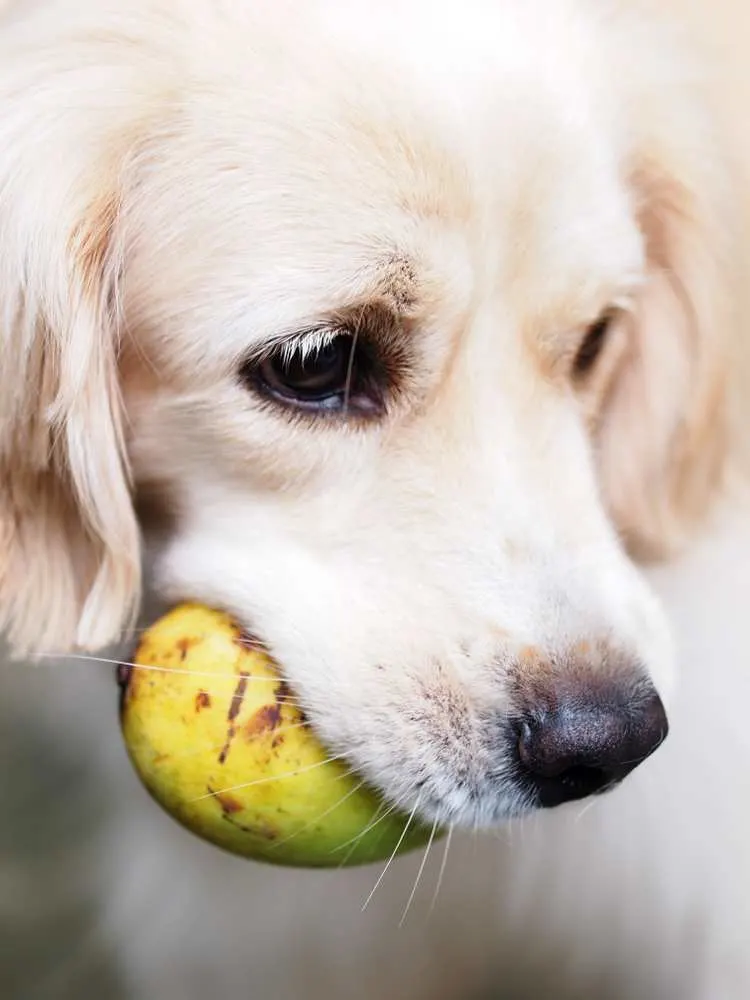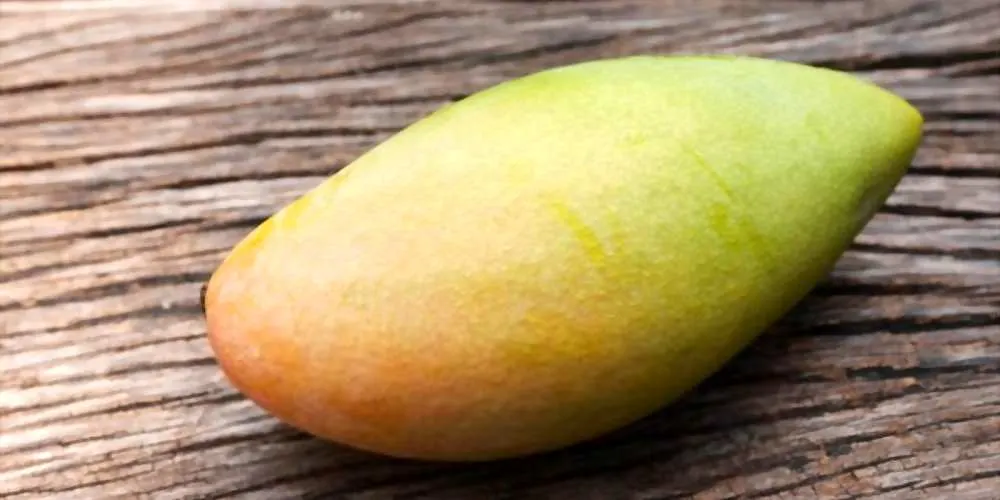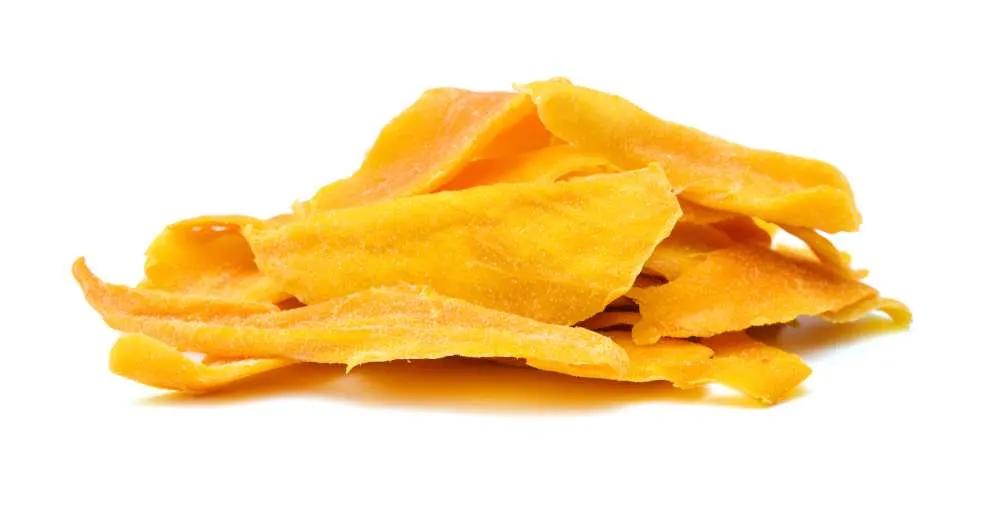Mango. Just the thought of this sweet, luscious orange fruit is enough to set your salivary glands to water.
If mango does this to you, imagine how your dog feels while watching you eat it!
Can dogs eat mango? Just leave a juicy slice unattended for a moment or two and you will quickly have your answer.
But should dogs eat mango? Is mango safe for dogs? Does mango have any beneficial vitamins or minerals that are healthy for dogs?
We will take a much closer look at these important questions in this article.
By the time you finish reading, you will know whether the mango is a safe treat to offer your dog.

Should Dogs Eat Mango?
Should dogs eat mango? The short answer to this question is “yes.”
But the longer answer is that it is vitally important to prepare the mango properly before offering any of it to your dog.
As a fruit, mango has a peel, a pit, and the tasty soft orange flesh. Only the last part of the mango is safe for your dog to eat.
Mango Peel
The peel may contain toxins or pesticides, especially if the mango is not organic. And mango skin can also be tough to chew and very hard to digest, which may cause gastrointestinal upset or even constipation.
So you definitely don’t want your dog to eat the mango peel.
Mango Pit
The pit of the mango is quite large and your dog should never be allowed to chew on it or swallow it.
The mango pit could get lodged in your dog’s throat and cause a choking risk. It could also get stuck in the intestine and cause a dangerous intestinal impaction.
If your dog chews on the hard, solid pit, it could easily cause your dog to break a tooth. Even if your dog does manage to chew into the pit and split it, the jagged edges could then cause perforation and internal bleeding once swallowed.
Dogs that swallow mango pits can have life-threatening health complications. If your dog ever does swallow a mango pit you will want to contact the nearest veterinary emergency room or urgent care center right away.
Even worse, as 1800PetMeds explains, fruit pits like mango pits can contain cyanide, a toxic poison.
Mango Fruit
The mango fruit is the only part of the mango that is safe for your dog to eat. The soft fruit is easy to chew and safe to swallow.
Dr. Marty, a canine veterinarian, explains that mango should always be given in moderation for these reasons:
- Mango fruit is high in sugar and calories.
- Mango fruit can cause food allergies in some dogs.
- Mango fruit can cause diarrhea and digestive upset in some dogs.

Does Mango Have Any Health Benefits for Dogs?
The American Kennel Club (AKC) states that mango does have several nutrients, minerals, and vitamins that can be beneficial to your dog’s health.
Dietary Fiber
Mango has insoluble dietary fiber, which helps aid in normal elimination and supports healthy digestion.
Like many fruits, mango has quite a lot of healthy insoluble dietary fiber, which can make it seem like great food to feed your dog regularly.
However, mango is still high in sugar and calories, which can cause your dog to put on weight and experience digestive distress.
To get the most benefit from mango’s dietary fiber, it is best to feed this fruit as an occasional treat only.
Vitamin A
Vitamin A is a critical vitamin to promote a healthy coat, healthy skin, vision and eye health, a variety of skin issues, and slow growth.
However, when too much vitamin A is offered, this can cause systemic toxicity that manifests as crippling arthritis.
It is important to be aware of all the sources of vitamin A that your dog is taking in to avoid deficiency or overdose.
Vitamin B6
Dogs that don’t receive enough Vitamin B6 can develop skin issues, immune system issues, tooth and kidney issues. Vitamin B6 is especially important to prevent kidney stones.
Vitamin C
Vitamin C is perhaps the best-known of all the vitamins on Earth. It is essential for health and immune system response. Because vitamin C is water-soluble, if your dog takes in a little bit too much, it will naturally come out in the urine.
Vitamin C is also very important for cartilage and bone, teeth and skin formation, and health.
Vitamin E
Vitamin E is important as a support for healthy vision, healthy cell formation, proper immune system function, and cognitive function. Vitamin E is also a powerful natural antioxidant with cancer-fighting properties.
Calcium
Calcium is vital to promote the proper growth of bones and teeth. But what many dog owners don’t know is that calcium is also important for muscle contraction and nervous system function as well as blood clotting.
From this list, you can see that mango is chock-full of some pretty important nutrients that your dog can definitely benefit from.
However, if you are feeding a commercial complete and balanced dog food, your dog may not necessarily need any supplementation of vitamins and/or minerals from other sources.
And too much of some vitamins, such as Vitamin A, can bring unwanted health problems. When in doubt, always ask your veterinarian before choosing to offer mango for supplementing vitamin and mineral intake.

Can Dogs Be Allergic To Mango?
Like people, dogs can be allergic to just about anything. Some dog breeds are more prone to food allergies than other dog breeds.
If your dog experiences any allergic reaction to mango, it is most likely going to be caused by ingesting the mango skin.
| Urushiol | – Mango skin contains the same active agent that is found in poison oak and poison ivy: urushiol. – Urushiol is what causes the itchy, uncomfortable feeling you get after brushing up against poison oak or poison ivy. – If you see your dog suddenly itching or scratching a lot and you know they just ate mango, urushiol might be causing an allergic reaction. |
| Cyanide | – As we mentioned earlier here, just like with many fruit pits, the mango pit can contain cyanide. |

How Much Mango Should Dogs Eat?
Dogs are not obligate carnivores (pure meat eaters) like wolves and cats. In fact, dogs are omnivores like people.
So dogs in general can and should take in some produce (fruits, vegetables) along with protein for the most balanced nutrition.
However, there are lots of types of products that could theoretically offer your dog the same vitamins and minerals and insoluble dietary fiber that mango can provide.
And mango can pack a caloric punch for pups that need to watch their waistline.
But you don’t have to worry as much about its sugar content since mango is considered a low glycemic index fruit. This means that even if your dog has been diagnosed as diabetic, you can likely still offer very small portions of mango safely.
Overall, the best way to offer mango to your dog is in very small treat-sized pieces in very small quantities.
If you want to give your dog some mango as a special treat, just offer a small sliver or two of the fruit only. Then wait 24 hours to make sure your dog doesn’t have any kind of allergic reaction or digestive disturbance.

Can Dogs Eat Dried Or Frozen Mango?
A tasty slice of simple, plain frozen mango can be a refreshing summer treat for your dog. It can help cool your dog down on a hot summer day.
However, you shouldn’t offer your dog any “human” frozen mango foods like sorbet or popsicles.
Dogs should not eat dried mango, which can stick to the teeth and cause cavities. Dried mango is also intensely high in sugar and can be difficult to chew and swallow.
And because dried mango is so concentrated, it is a lot easier to take in far too many calories which can cause weight gain.
When in doubt about whether to offer mango as a fresh fruit treat for your dog, always talk with your dog’s veterinarian first. Your vet can advise you on the frequency and portion size.
Learn More: What Can Dogs Eat? A Comprehensive List Of Dog-safe Foods

